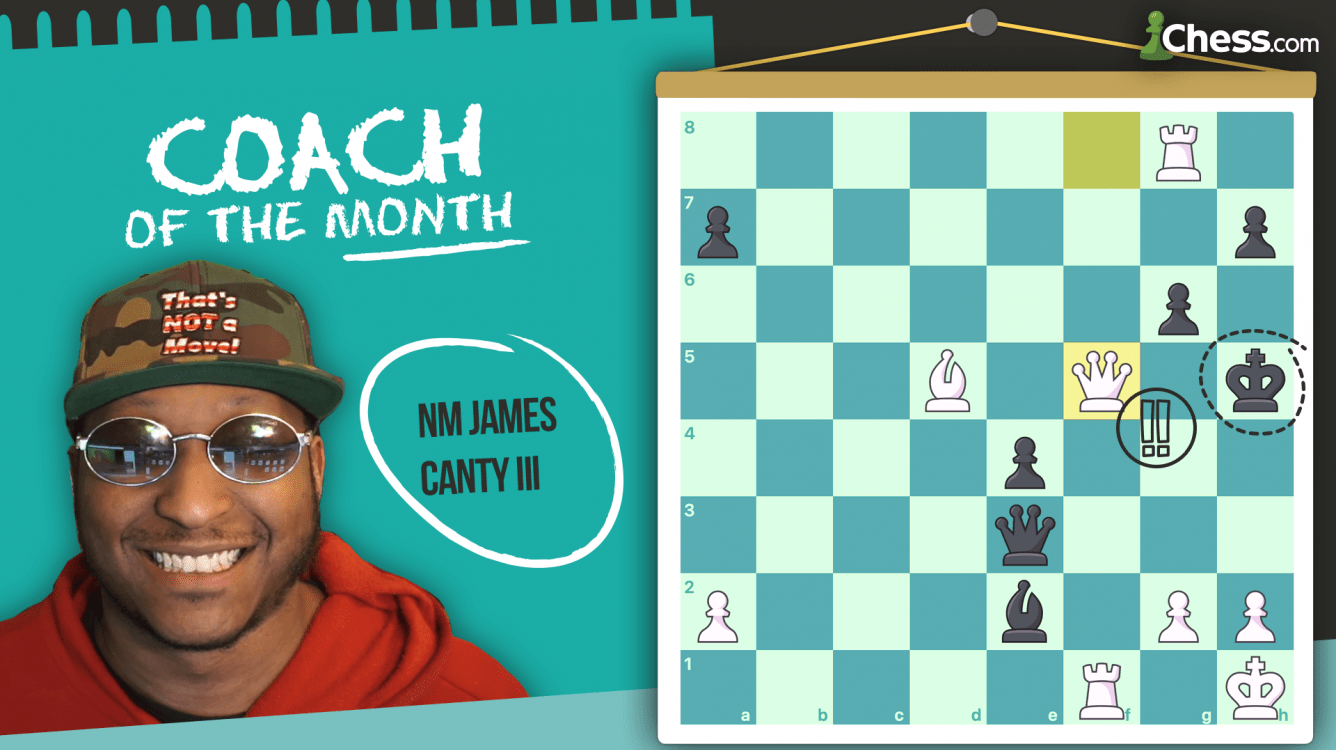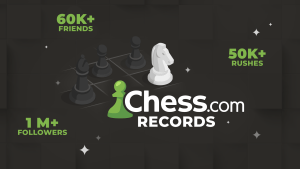
Coach Of The Month: James Canty III
Chess.com's newest Coach of the Month is NM James Canty III! Canty is a familiar face on Chess.com and Twitch. Whether he's enriching Arena Kings with his witty and insightful commentary or flexing his sharp tactical skills on stream, the "Jedi master" never fails to deliver top-notch entertainment for his more than 15,000 followers whenever he goes live. You can watch his live streams and videos on his Twitch and YouTube channels.
However, Canty's success is not only limited to his career as an entertainer. The national master is also an outstanding chess coach who is sure to give players what they need to take their game to the next level!
Readers seeking private instruction can contact James Canty III via his Chess.com profile and can find other skilled coaches at Chess.com/coaches.
At what age were you introduced to chess, and who introduced you?
I learned chess when I was eight years old. My father taught me, and we bonded a lot with it. Growing up in Detroit you can get into trouble fast, and chess kept me occupied—plus I loved it! I lost game after game, but wanted to keep playing. My dad and I would play for hours, and I lost every game for two years straight! When I beat my dad, it all changed for me.
What is your first vivid memory from chess?
Beating my dad for the first time, in the living room on my sister's birthday on February 2nd, 2002. I lost every game we played for 2 years, so that first win was LEGENDARY lol.

Which coaches were helpful to you in your chess career, and what was the most useful knowledge they imparted to you?
My first coach was NM Bill Calton who coached me for a few months. I learned a lot about how to think about chess, and I solved LOTS of tactical puzzles, which sparked my love for tactical positions! It is still my strongest suit today. My middle school chess coach, the late Harold Steen, helped me when I was an 1800-1900 player and taught me the French Defense.
One memory from my coach Calton was when he was taking lessons with the legendary GM Ben Finegold. I was able to sit in on the lesson, and Ben said, "play the board, the board will tell you what to do." As I got stronger, I still remember that quote, which helps psychologically because sometimes when you are going through the ranks and you see a rating or a title greater than yours, you can mentally defeat yourself before the game even starts. Play the board, play your game—it will tell you what to do.

My next coach was the legendary GM Roman Dzindzichashvili in 2014 when I was living in Atlanta. I won $20,000 at the first Millionaire Chess Open! What helped me the most was his opening books Chess Openings For White Explained and Chess Openings For Black Explained.
After I won the money I called him up and said "Yo man, I won some money from your material, I gotta get some lessons!" From him, I learned about how to train effectively with blitz chess, positional sacrifices, and always playing actively.
Fast forward to 2019, I took lessons with the great chess trainer GM Arthur Kogan, who taught me about the Russian School of Chess, how to think like a GM, and a lot more. Recently I have been working with GM Tanguy Ringoir, a self-taught GM and very strong opening specialist! We work on just about everything, including some weaknesses of mine I have trouble with.
Which game do you consider your "Magnus Opus?"
My all-time favorite game is against IM Roberto Martin Del Campo! Queen sac and mate in the end. Check it out:
How would you describe your approach to chess coaching?
My approach has grown a lot over the years. I became an expert in eighth grade, reaching a 2000 US Chess rating. I climbed over the 2200-barrier and have been a chess coach for 15 years now.
I have seen the most growth and results when I started treating chess like "school" with my students. I type up notes as we talk on key points and ideas, and then I assign them homework at the end. Just like in school, to pass the test and do well in class it's always beneficial to take notes so you can study them later so you're ready when the time comes. In chess, it's the same way: study hard, do your homework, and pass the test (win games).

What do you consider your responsibility as a coach and which responsibilities fall on your student?
My responsibility as a coach is to teach the student the things they would like to know first. Then it is up to me to make sure they understand the main weaknesses in their rating class and the positional concepts they need to dominate on that level and beyond. The responsibility of my student is to always ask questions and do their homework after each lesson.
What is a piece of advice that you give your students that you think more chess players could benefit from?
I love to teach my students the three questions, something I learned from GM Jacob Aagaard's book Grandmaster Preparation: Positional Play.
More often than not, even on the first move (to build up the discipline to continue to ask these questions throughout the whole game) you should ask yourself three questions to help you make better decisions consistently and limit blunders.

The three questions are:
1. What are the weaknesses in the position (for both sides)? This could be: weak king, weak squares, weak files and diagonals, weak pawns, undefended pieces or pawns, undeveloped pieces, less space, etc.
2. What is my worst-placed piece (for both sides)? Sometimes you can find the right idea for the position or find something completely different/hidden gems by just asking this question right here.
3. What is my opponent's idea? This helps reduce your blunders! Try this, literally ask this question, and what naturally happens when you do it? You'll probably look around the whole board and try to figure out your opponent's idea, right? That's good. You should be looking at the whole board anyway before moving so you don't miss anything, and this question helps you a lot in that sense.
And that will be $75 for that information. You're welcome lol.
What is your favorite teaching game that users might not have seen?
I have this method I teach my students called "The Drag and Drop Method." It's like when you download a file on your computer, and you drag it with your mouse over to another folder or file—I applied this to chess.
Sometimes in an attack, you may be missing the firepower needed to deliver the blow. In this case, you want to use your imagination and realistically think of a situation where certain pieces can work together to get the desired result.

So, if I could pick up any piece and realistically place it on a square (drag and drop), where would that be? Then try to get it there.
I applied exactly that method in this game against 2300-rated NM Matthew Plucket in the 2019 World Open, Round 9:
What is the puzzle you give students that tells you the most about how they think?
I love to show students this puzzle, and series of other puzzles just like it, to show them the power of always considering the most forcing moves first—even if they don't make sense. That's because if they work, you win.
Do you prefer to teach online or offline? What do you think is different about teaching online?
I prefer online, because there's nothing like being in the comfort of your home! Online teaching is different because it is not the physical board, and if you don't have lots of experience in over-the-board chess then this transition could be difficult.

What do you consider the most valuable training tool that the internet provides?
Chess.com's Explorer is my absolute favorite. I can see my stats on games, how many games reached a certain position, and who else has played it. This helps when it comes to expanding ideas in the middlegame and endgame. I can understand the most common plans and ideas due to the volume of relevant games I can search for in seconds.
Which under-appreciated chess book should every chess player read?
Forcing Chess Moves by Charles Hertan.
Prior coach of the month winners:
- IM Levy Rozman
- CM Gabor Horvath
- Colin Stapczynski
- NM Bojan Lukajic
- IM Mateusz Bobula
- IM Attila Turzo
- GM Max Illingworth




